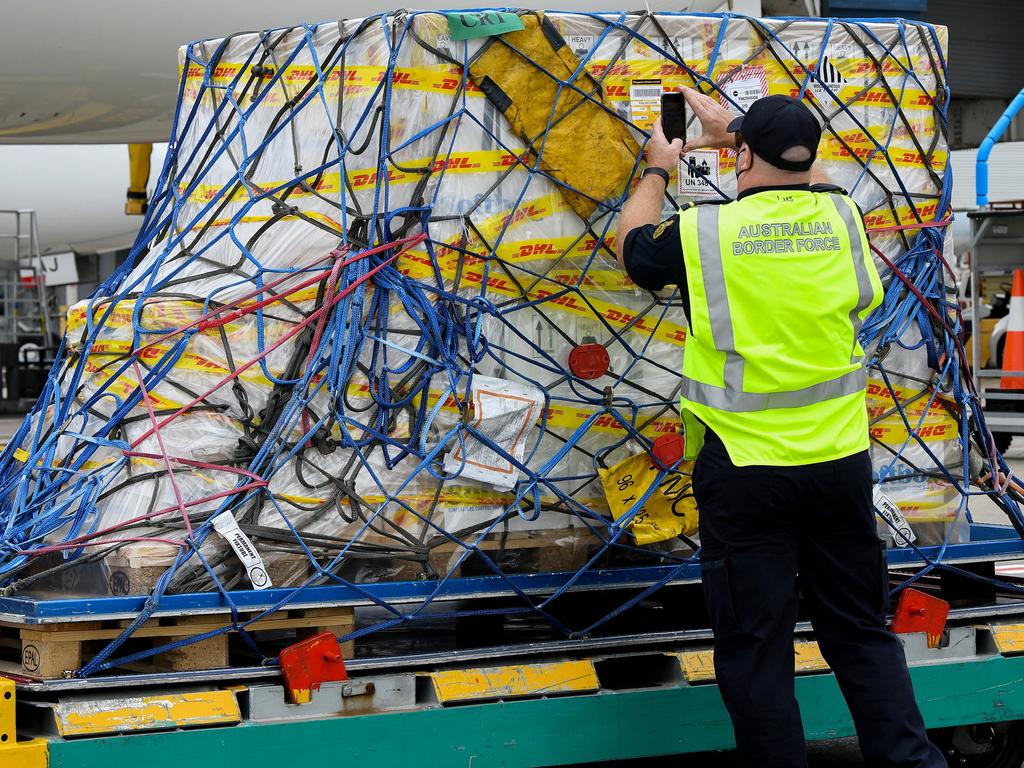Queensland explainer: When and how you will get the COVID-19 vaccine
The first of Australia’s COVID-19 vaccines will be rolled out next week, but what does it mean for Queenslanders? We answer all your questions.
Here’s what you need to know ahead of the start of the COVID-19 vaccination rollout next week.
Which COVID-19 vaccine will be given to Queenslanders first?
The Pfizer shot, dubbed COMIRNATY, will be rolled out first. Australia has secured 10 million doses of the Pfizer vaccine with 142,000 arriving on Monday. The AstraZeneca vaccine was approved for use in Australia by the Therapeutic Goods Administration on Tuesday morning for adults aged over 18. About 1.2 million AstraZeneca doses are due in Australia early next month, allowing the rollout to be expanded in combination with the Pfizer vaccine.
Which vaccine are most Queenslanders likely to receive?
The Oxford University AstraZeneca vaccine – which can be kept in a normal refrigerator and administered by GPs – is likely to be rolled out to the majority of Queenslanders. Authorities have secured access to 53.8 million doses with 50 million to be made in Australia over the year.
Will the Pfizer vaccine be available to people living in remote areas of the state?
No, because the Pfizer shots need to be stored at -70C. They also come in batches of 975 vials, with each vial containing about six doses. Once defrosted, they must be used within five days or thrown out, making their use outside cities or large regional centres unlikely.

When will the rollout begin in Queensland?
Phase 1A will start on February 22, first with the Pfizer vaccine and later the AstraZeneca.
Where are Queensland’s vaccine hubs?
Pfizer “hubs” will be at Gold Coast University Hospital, Cairns Hospital, Townsville University Hospital, Sunshine Coast University Hospital, the Brisbane and Women’s Hospital and Princess Alexandra Hospital. The Gold Coast will be the first hub where the jab will be rolled out.
Who will get the first vaccinations?
Under Phase 1A, quarantine and border workers, frontline health care workers most exposed to the virus, and aged care and disability care staff and residents will have first access.

H ow does the rollout continue from there?
Under Phase 1B, mostly AstraZeneca and some Pfizer vaccines will be available at GPs and state-run clinics – and later pharmacies – to elderly adults aged over 70, other health care workers, Aboriginal and Torres Strait Islander people aged over 55, younger adults with an underlying medical condition, and critical and high risk workers including defence, police, fire, emergency services and meat processing.
Under Phase 2A, vaccines will be available to adults aged over 50, Aboriginal and Torres Strait Islander people under 55, and other critical and high risk workers.
The final phase will see everyone over the age of 16 have access to the vaccines and this is expected to occur by the end of October.
How does the Pfizer jab work?
The Pfizer vaccine is made from messenger RNA, known as mRNA. Rather than having viral proteins injected to induce an immune response, people receive genetic material that encodes the viral protein. This gives the immune system a preview of what the real virus looks like without causing disease. It allows a person’s immune system to develop antibodies that can neutralise the real virus if an individual is ever infected.
About 30 people in aged care in Norway died after they received the Pfizer vaccine. Is the vaccine a danger in the elderly?
The European Medicines Agency’s pharmacovigilance risk assessment committee recently concluded that there was not a specific safety concern regarding the Norwegian cases. No causal link between the jab and deaths could be established.

How does the AstraZeneca vaccine work?
It uses a harmless, modified version of a common cold virus that usually only spreads among chimpanzees. The modified virus, which cannot make a person sick, carries a gene from the COVID-19 virus’s spike protein. This allows the immune system to manufacture antibodies that would work against COVID-19.
South Africa has paused the AstraZeneca rollout after early data from a small study suggested the vaccine offered only “minimal protection” against mild disease caused by the South African variant. Is Australia likely to follow suit?
Health Minister Greg Hunt has said Australian authorities saw no need to follow suit, referring to the jab’s “outstanding results” in the UK.




